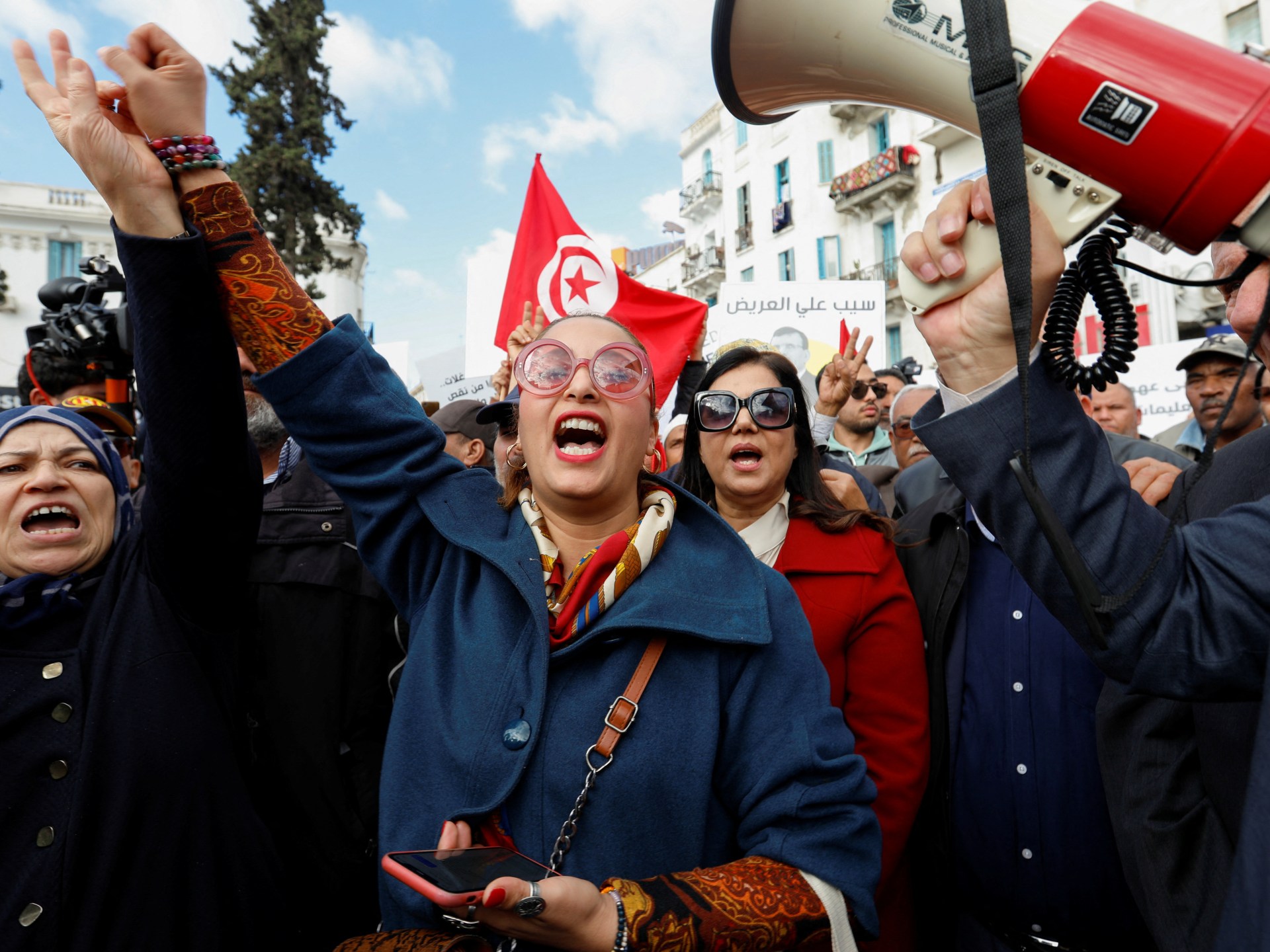Today, Thursday, the authorities in Tunisia charged two opponents who were arrested by the security forces as part of an escalating campaign of arrests of opponents of President Qais Saeed's measures, while the head of the Ennahda Movement, Rashid Ghannouchi, is again under investigation in another case.
The security forces arrested the Secretary-General of the Republican Party, Issam Al-Shabi, and the leader of the opposition National Salvation Front, Shaima Issa, last night, and they were transferred to a detention center in the Tunisian capital.
In statements to Al-Jazeera, Al-Shabi's lawyer, Amin Booker, said that Essam Al-Shabi and Shaima Issa were charged with "belonging to a terrorist organization" and "conspiring against the internal and external security of the state," indicating that they are being investigated.
Booker added that the search and raid against Chebbi took place "outside the framework of legal procedures," as he put it.
Chebbi was arrested and his house was searched (French)
For a meeting in a coffee shop
Lawyer Amin Boker told a local radio that the file that the "National Unit for Combating Terrorism" is undertaking regarding Essam Al-Shabi and Shaimaa Issa relates to a meeting held in a cafe in the capital with the political activist Khayyam Al-Turki, who was suspended a few days ago.
Al-Turki and others were referred for investigation on charges of "conspiracy against state security." Opponents said that the aim of those meetings was to unite the divided opposition.
Sources from the National Salvation Front also told Al-Jazeera that the security authorities are pursuing the leader of the front, Jawhar bin Mubarak, with the aim of arresting him, which was confirmed by other sources.
In addition to al-Turki, other political activists were arrested, including the former leader of the Ennahda movement Abdelhamid Jelassi, Noureddine al-Buhairi, former Minister of Justice and Vice President of Ennahda, businessman Kamal al-Latif, and the director of the private Mosaic radio station, Noureddine Boutar. Former Prime Minister Ali Larayedh, who has been arrested since Two months in what is known as the issue of sending fighters to Syria.
The recent arrests also included a trade union official, and other politicians, lawyers and the Syndicate of Journalists were summoned to investigate various cases.
Several parties saw these arrests as an attempt to intimidate the opposition, while the Tunisian president says that they fall within the framework of accountability and the application of the law.
On the other hand, Tunisian President Kais Saied said yesterday, Wednesday, that there are "frenzied" campaigns by people he described as hired abroad to strike the Tunisian state.
Saeed added that he is waging what he called a "national liberation war," calling on the judiciary to play its role and apply the law to everyone.
The Tunisian president also said that what he described as cancerous cells must be eliminated inside the country, either by radiation or by chemical means, adding that these cells are present in the body of the state and they must be held accountable before the Tunisian people and the law applied to everyone, as he put it.
Ghannouchi was investigated in several cases (French)
Ghannouchi is under investigation
In parallel with the arrests, the head of the Ennahda Movement, Rashid Ghannouchi, is scheduled to appear today, Thursday, before a security investigator in the El-Awaina barracks in the Tunisian capital, to hear him in a new case brought against him by an unknown party.
Two days ago, a judge decided to keep Ghannouchi in a state of release after interrogating him in a case brought against him by a security union, and it was known in the media as the “atonement of the security” case.
The head of the Ennahda movement was under investigation in various cases, including money laundering, and described the accusations against him as fabricated and aimed at hitting the movement.
European concern
Meanwhile, the European Union said that it is following with concern the recent developments in Tunisia, which it considered a very close neighbor with which it has a deep and strategic partnership.
The European Union added - in a statement - that Tunisia is going through a sensitive moment, and expressed its hope that the Tunisian authorities will be able to find appropriate solutions to many of the current and future challenges facing the country.
This European position comes amid international concern about the violations and the situation in Tunisia, and it also comes days after the expulsion of a European trade union official from Tunisia.

